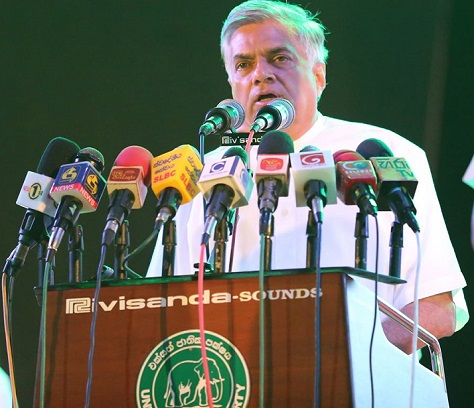Mahinda Rajapaksa, the former president who ended Sri Lanka’s civil war, was pushed out of office in January when his decision to call a presidential election two years early backfired.![]()
In Monday’s parliamentary elections, however, Rajapaksa hoped to win a comeback as prime minister — especially as his successor, one-time ally and former health minister Maithripala Sirisena, struggles to rebalance power away from the presidency and toward the unicameral Sri Lankan parliament.
Rajapaksa appears to have failed, and even before full results were announced, he had conceded defeat on Tuesday morning, handing the once-powerful president his second electoral defeat in eight months. Nevertheless, he appeared to have won election as a member of parliament, where he will continue to attempt to block Sirisena.
Sirisena, who won January’s election as the candidate of the opposition coalition, struggled to pass legislation through Sri Lanka’s parliament following his stunning victory earlier this year. Sirisena’s attempts at pushing through a wishlist of reforms in his first 100 days hit several roadblocks as Rajapaksa supporters blocked many Sirisena priorities, including changes to the country’s election law, though Sirisena has already been successful in reducing some presidential powers and restoring a two-term presidential limit. Faced with gridlock for deeper political reforms, Sirisena dissolved Sri Lanka’s parliament in June and called the August 17 elections nearly half a year early, eager to win a fresh mandate for his attempts to introduce new checks and balances on Sri Lanka’s political system.
* * * * *
RELATED: Sirisena easily wins Sri Lankan presidency
RELATED: Tumultuous election a test for Sri Lankan democracy
* * * * *
Most immediately, the parliamentary election has four major implications:
- First, it almost certainly brings to an end the chances of a Rajapaksa comeback anytime soon. That’s quite a feat for the anti-Rajapaksa forces, who just months ago worried that Rajapaksa would use the military to stop any democratic transfer of power. Allegations that Rajapaksa may have had a role in the murder of Wasim Thajudeen, a Sri Lankan national rugby star who died in a mysterious car crash in 2012, hurt the former president throughout the campaign and could continue to haunt him as a member of the Sri Lankan parliament.
- Second, it’s an endorsement for the pro-reform agenda of Sirisena and his supporters in the Sri Lanka Freedom Party (SLFP, ශ්රී ලංකා නිදහස් පක්ෂය). Though Sirisena ran against the SLFP in January, it elected him as its leader in March, many of the party’s members remained loyal to Rajapaksa. The SLFP’s apparent election loss, therefore, is not the worst result for Sirisena, who has worked more closely with the opposition since January than his own party.
- Third, it cements Sri Lanka’s diplomatic reorientation toward New Delhi and away from Beijing — Sirisena has worked to disentangle Sri Lanka from Chinese infrastructure projects that were designed to make the island nation a Chinese satellite in South Asia.
- Fourth, and perhaps most importantly, the results empower the leader of the opposition United National Party (UNP, එක්සත් ජාතික පක්ෂය), prime minister Ranil Wickremesinghe (pictured above), who is set to become nearly as important as Sirisena in setting Sri Lanka’s policy agenda in the years ahead. Though they technically head the country’s two competing parties, Sirisena and Wickremesinghe teamed up in the January elections, share a common enemy in Rajapaksa and share mutual reform goals.
Political lines are still severely divided between the pro-UNP Tamil-speaking communities and the pro-Rajapaksa Sinhalese-speaking communities (who typically practice Hinduism). Sirisensa will continue to walk a fine line between the two groups, neither of which appear to have won an absolute majority in the 225-member parliament.
But the UNP’s victory gives the country’s Tamils (who practice Buddhism) and Tamil-speaking Moors (who practice Islam) a greater sense of political participation than they might otherwise have felt under the Rajapaksa regime. Rajapaksa’s military victory over the pro-independence Tamil Tigers ended Sri Lanka’s long-simmering civil war, he has been criticized for military methods that sometimes ignored human rights and political methods that excluded Tamil minorities. Sirisena promised to introduce a war crimes inquiry upon his election, but that effort, too, has stalled since his inauguration.
Sirisena and Wickremesinghe now have a mandate to double down on reforms that could make Sri Lanka’s political system more conciliatory and inclusive by giving the judiciary and parliament more independence from executive power — in contrast to Rajapaksa’s efforts over the past decade to centralize presidential power.
The relatively smooth voting process, in a country where elections have routinely been fraught with violence, is also an impressive victory, insofar as it deepens Sri Lankan democracy and the strength of the country’s rule of law.
